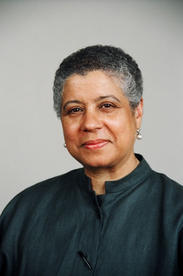New Director of Ageing Programme Shares Thoughts on Effective Philanthropy
Resource type: News
The Atlantic Philanthropies |
The Atlantic Philanthropies profiles Sharon King, the new Director of the Ageing Programme as she shares her thoughts on effective philanthropy.
 AP: Sharon, tell us a little about your personal history.
AP: Sharon, tell us a little about your personal history.
SK: I grew up in Maywood, Illinois. My parents wanted to make sure that their children got a decent education and that meant finding an integrated school. In our working class community, that meant parochial schools. I came east to college and then went back to Chicago for my masters and law degrees. I think another important factor is that I came of age during the sixties, which was a time when we were questioning existing power relationships. I do think that has had an influence on how I think about my life and my professional career.
AP: So what prompted your interest in philanthropy?
SK: I was interested in philanthropy as a vehicle for change – a means of getting resources to communities that need them and helping the people and communities we care about make things better for themselves. Very early in my career, I found that I had certain skills that are helpful in philanthropy – bridging skills (being able to connect low-income communities to those who have money), listening skills, the ability to build relationships, and writing and analytical skills.
AP: When did you first learn about philanthropy?
SK: Well, it wasn’t called philanthropy, at least in my mind. When I was just out of college, I worked for the Community Development Agency here in New York which was part of the Johnson Administration’s Office of Economic Opportunity and the War on Poverty. One of our responsibilities was to distribute funds to 26 poverty areas around the city. It was grantmaking, basically, and I’m doing the same thing now – helping to make these connections, identifying effective opportunities, and moving money along in an organized, strategic fashion.
AP: In 1992, you began working for the F.B. Heron Foundation, which is well known for promoting economic development of low-income families. How do you plan to apply what you learned in your 18 years at Heron to your leadership of Atlantic’s global Ageing Programme?
SK: I think that I’ve learned how to do philanthropy effectively. We don’t just give money to organizations; we also support the people in those organizations. Grantmaking isn’t about telling others what to do. It’s about building on their interests and helping them to be successful in achieving whatever goals you agree on together.
In terms of the issue area – ageing – I’m closest to the Programme’s strategy focused on economic security for older adults, based on my background. I think I have some expertise to share, in the sense of knowing who’s doing good work in the field, particularly for populations historically marginalised.
And I have to say, as an older adult, there is some self-interest here. I am very interested in the work that’s done at Atlantic and by our grantees, not just professionally, but personally. For every one of us, it’s our grandparents or parents who are facing these very real issues. If you take the issues that our own families are dealing with and think about them in terms of someone who is barely managing on a small pension or social security check, then you have a sense of the challenges they face.
AP: Are you thinking about the work in terms of helping families?
SK: Absolutely! I look forward to working with our colleagues in the Children & Youth Programme to take a deeper look at the intergenerational aspect of what we and our grantees are doing or might do. The ultimate intergenerational unit is the family, of course. Sometimes I think we get so focused on our programme silos that we miss “real life” where intergenerational aspects are readily apparent.
AP: What are your priorities for the first twelve months of your tenure here?
SK: What really attracted me to the position at Atlantic was the foundation’s emphasis on working within a social justice framework. So, first, I want to work with the Ageing Team on how to apply a social justice lens to our grantmaking. What more should we be doing – or what should we be doing differently – to see social justice impact before Atlantic closes its doors? Of course, I also want to learn more about the ageing field and about Atlantic’s Ageing grantees.
AP: Do you have any thoughts on how Atlantic can share what we learn about social justice philanthropy and the ageing field as we spend down?
SK: I agree that it has to be a part of our responsibility to share this information. There’s a lot that’s been learned and that we can continue to learn. I think our first audience, our grantees, should have the benefit of our global network. For instance, our grantees in the Republic of Ireland and Northern Ireland are organizing some extraordinary efforts, and our U.S grantees should have the benefit of learning about that. Why shouldn’t older adults in, let’s say, North Carolina, not be able to learn as peers with the retirees who developed the Pensioners’ Manifesto in Northern Ireland? I don’t have any specific plans to implement yet, but I’m excited about the possibilities.
AP: Do you have a message for the grantees of the Ageing Programme?
SK: Thank you for what you’ve done and continue to do! From what I’ve seen, in each country you’ve made important contributions to the field, and to older adults and their families. I’m looking forward to getting out and meeting you. I’m really interested in learning more about the results you have delivered with the foundation’s investments. I also want to know what you think the challenges and opportunities are as we move forward within the social justice framework.
For more information on these programmes: